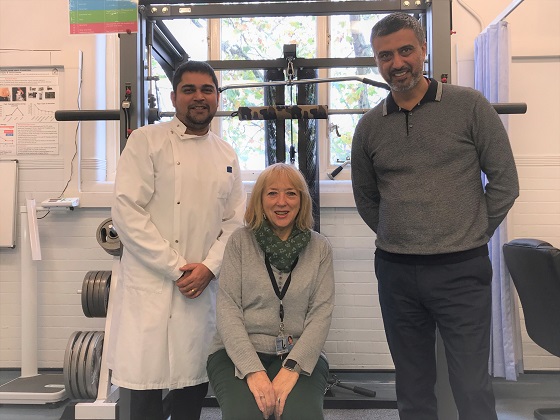A professor involved in ground-breaking research into diabetes is appealing for volunteers to help with her latest project at De Montfort University Leicester (DMU).
Professor Joan Taylor, from the Leicester School of Pharmacy, is appealing for people who have type one or type two diabetes to take part in a 16-week programme that is designed to detect if patients have been wrongly diagnosed with type two diabetes when they in fact have slowly-developing type one and are insulin-dependent.

Unmesh Desai, Professor Taylor and Dr Sahota in the exercise laboratory
The latest research is looking into what is known as Latent Autoimmune Diabetes in Adults, or LADA, which has been named by some as type 1.5 diabetes.
It is an autoimmune disease, like type one diabetes, and will almost certainly mean the patient will eventually become insulin dependent in later life.
Professor Taylor, along with senior technician Unmesh Desai and senior research fellow Dr Tarsem Sahota, wants to monitor people with diabetes using an exercise programme to see if they are showing signs of LADA so that they can be checked out by their GP and receive insulin treatment at an earlier stage.
Volunteers who have taken part in previous exercise-based research, which involves weekly hour-long monitored sessions in a laboratory, have seen a marked improvement in their fitness and general health.
In some cases, patients have seen their type two diabetes go into remission thanks to improving their diet and exercise regime and experiencing weight loss over the period.
Professor Taylor explained: “We believe there are people with type 1.5 diabetes who think they are type two, but their real condition has not been spotted and they are in fact insulin-dependent type one.
“They are not realising they are not producing enough insulin at all.
RELATED NEWS
Be inspired. Come to our next DMU Open Day
Want to lose weight? Go nuts, says DMU nutritionist
New machine at DMU could help early detection of diseases
“It is not a very common condition but this research is about getting people recognised early enough to make a marked difference to their lives.
“Eye damage and nerve damage could be busy developing while not being treated properly. It may take months or even years before they are properly diagnosed.
“We may not be able to give a definite diagnosis but the results of the research will let them know if they have to get further help for their diabetes and avoid further complications later in their life.”
The research project is looking for people who are type one, LADA or type two diabetes, aged between 30 and 65, that are willing to take part in 16 hour-long sessions in a DMU physical exercise laboratory.
The lab is fitted with gym equipment and monitoring equipment.
The first four sessions are to compile ‘baseline’ readings of glucose levels, heart rate, blood pressure, cholesterol and oxygen and carbon dioxide exchange rates. It will also involve blood tests to distinguish between type one and type two diabetics and reveal those who are LADA.
Professor Taylor said: “The sessions are one to one so that means we do not just pay attention to what their results are, we are also here to listen.
“A lot of people with type one or type two want to talk about the condition and want time to talk through their current lifestyle and any difficulties they are having.
“The people who have taken part before have really lapped it up. They are not only contributing to important research but they are benefitting from the exercise
“We have had a few cases in previous research where people notice they are less tired, blood glucose goes down and they experience a reversal in type two due to following the recommended diet changes and experiencing weight loss.
“The exercise routines are at 60 per cent capacity so it is not overly strenuous.”
Volunteers will receive a 50 per cent discount on gym membership at DMU’s QEII Leisure Centre if they complete the course and are also provided with a Fitbit during the 16-week period so they are constantly monitored.
Professor Joan Taylor’s research was broadcast around the globe when she came up with a prototype for the world’s first surgically-implanted artificial pancreas.
The wrist watch-sized device would eliminate the need for daily injections for patients with type one diabetes. The research into this project is still ongoing.
Professor Taylor added: “We are also passionate about keeping people with diabetes healthy and well using conventional treatment.”
If you would like to take part in the research or discuss it in more detail contact Unmesh Desai on 0116 250 6220 or email udesai01@dmu.ac.uk
Posted on Monday 18 November 2019